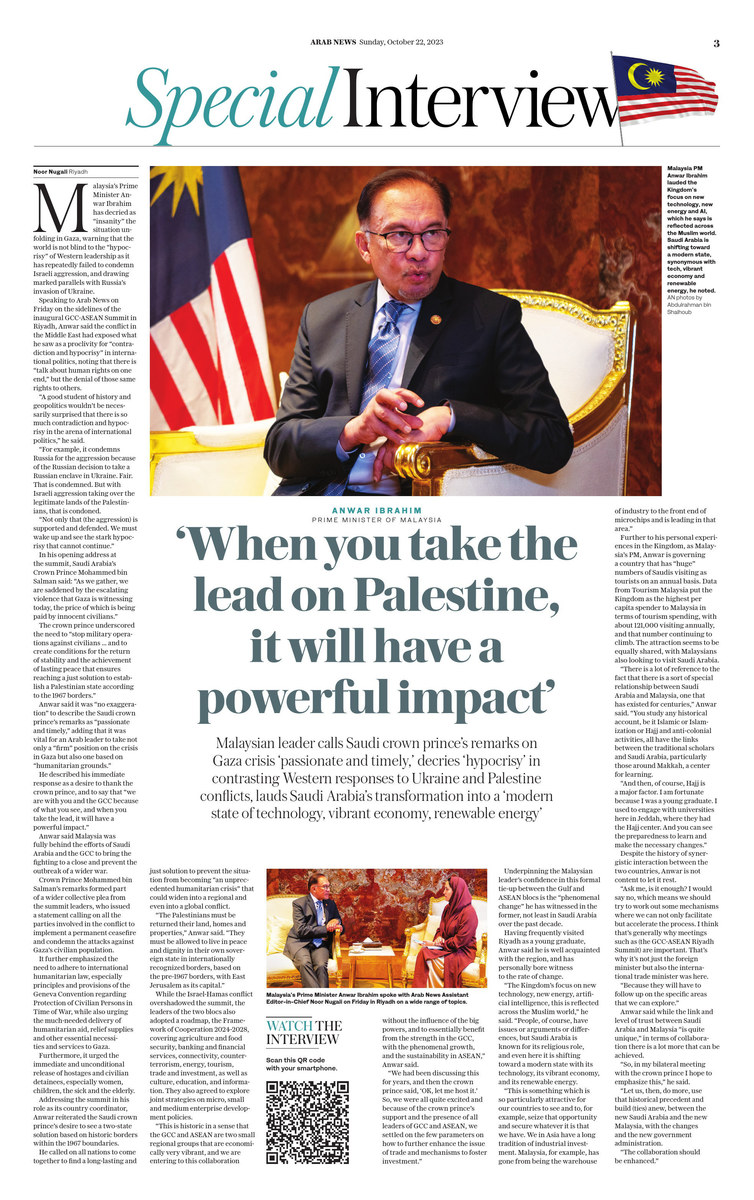RIYADH: Malaysia’s Prime Minister Anwar Ibrahim has decried as “insanity” the situation unfolding in Gaza, warning that the world is not blind to the “hypocrisy” of Western leadership as it has repeatedly failed to condemn Israeli aggression, and drawing marked parallels with Russia’s invasion of Ukraine.
Speaking to Arab News on Friday on the sidelines of the inaugural GCC-ASEAN Summit in Riyadh, Anwar said the conflict in the Middle East had exposed what he saw as a proclivity for “contradiction and hypocrisy” in international politics, noting that there is “talk about human rights on one end,” but the denial of those same rights to others.
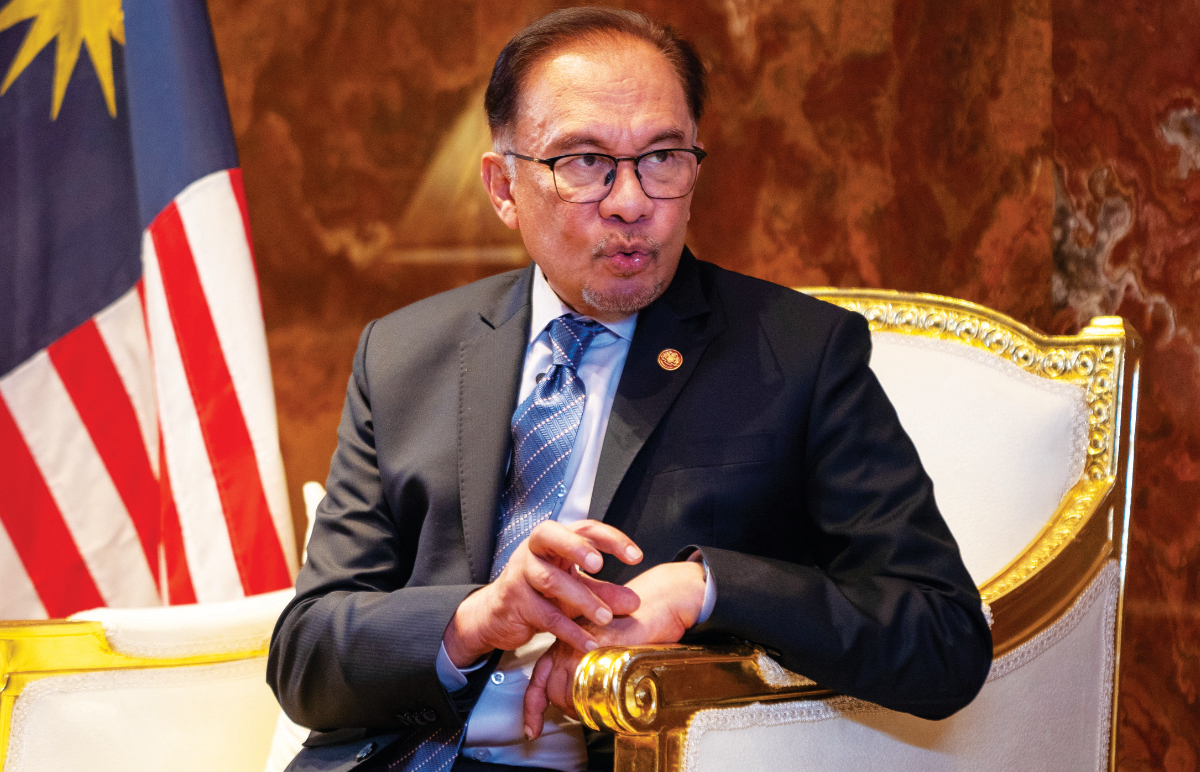
Anwar Ibrahim, prime minister of Malaysia. (AN photo by Abdulrahman bin Shulhub)
“A good student of history and geopolitics wouldn’t be necessarily surprised that there is so much contradiction and hypocrisy in the arena of international politics,” he said.
“For example, it condemns Russia for the aggression because of the Russian decision to take a Russian enclave in Ukraine. Fair. That is condemned. But with Israeli aggression taking over the legitimate lands of the Palestinians, that is condoned.
“Not only that (the aggression) is supported and defended. We must wake up and see the stark hypocrisy that cannot continue.”
In his opening address at the summit, Saudi Arabia’s Crown Prince Mohammed bin Salman said: “As we gather, we are saddened by the escalating violence that Gaza is witnessing today, the price of which is being paid by innocent civilians.”
The crown prince underscored the need to “stop military operations against civilians ... and to create conditions for the return of stability and the achievement of lasting peace that ensures reaching a just solution to establish a Palestinian state according to the 1967 borders.”
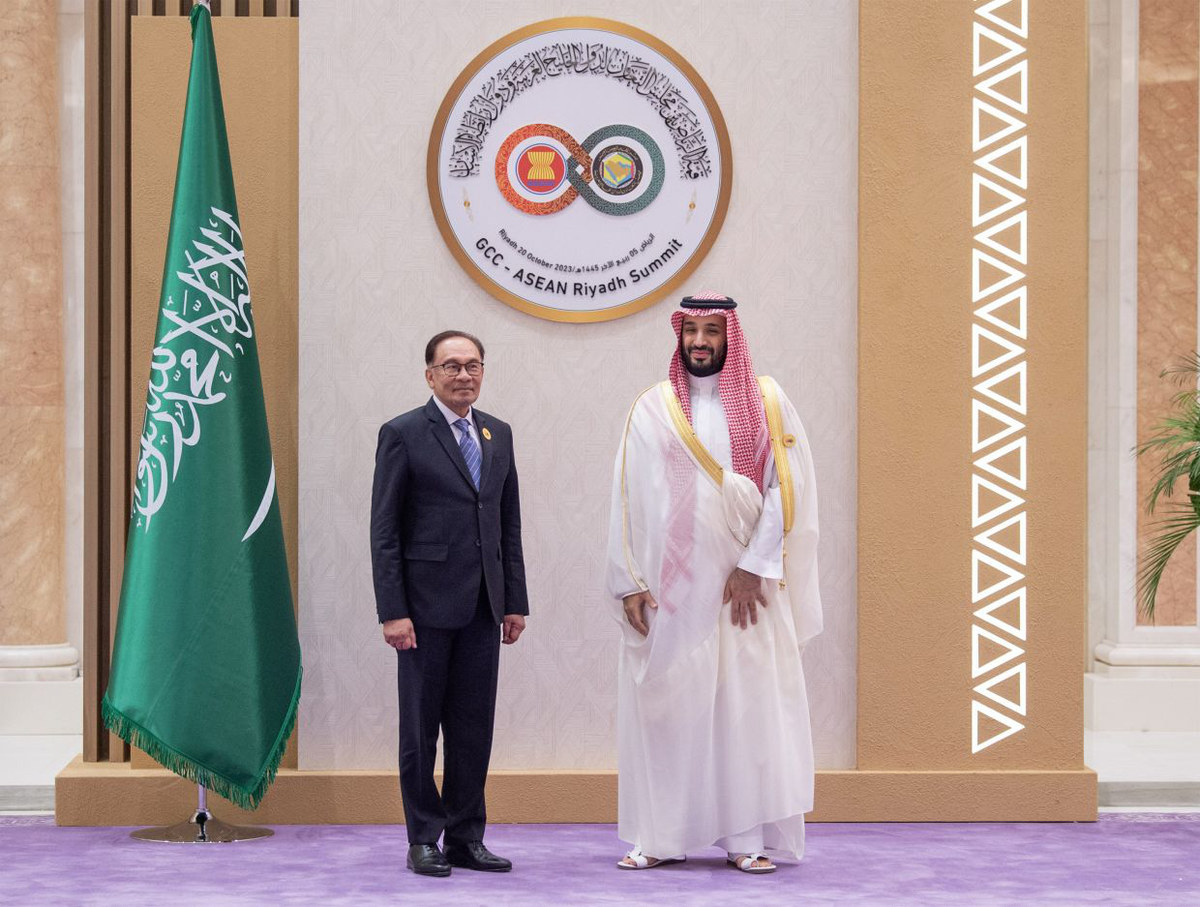
Malaysian PM Anwar Ibrahim with Crown Prince Mohammed bin Salman at the inaugural GCC-ASEAN Riyadh Summit on Oct. 20, 2023. (SPA)
Anwar said it was “no exaggeration” to describe the Saudi crown prince’s remarks as “passionate and timely,” adding that it was vital for an Arab leader to take not only a “firm” position on the crisis in Gaza but also one based on “humanitarian grounds.”
He described his immediate response as a desire to thank the crown prince, and to say that “we are with you and the GCC because of what you see, and when you take the lead, it will have a powerful impact.”
Anwar said Malaysia was fully behind the efforts of Saudi Arabia and the GCC to bring the fighting to a close and prevent the outbreak of a wider war.
Crown Prince Mohammed bin Salman’s remarks formed part of a wider collective plea from the summit leaders, who issued a statement calling on all the parties involved in the conflict to implement a permanent ceasefire and condemn the attacks against Gaza’s civilian population.
It further emphasized the need to adhere to international humanitarian law, especially principles and provisions of the Geneva Convention regarding Protection of Civilian Persons in Time of War, while also urging the much-needed delivery of humanitarian aid, relief supplies and other essential necessities and services to Gaza.
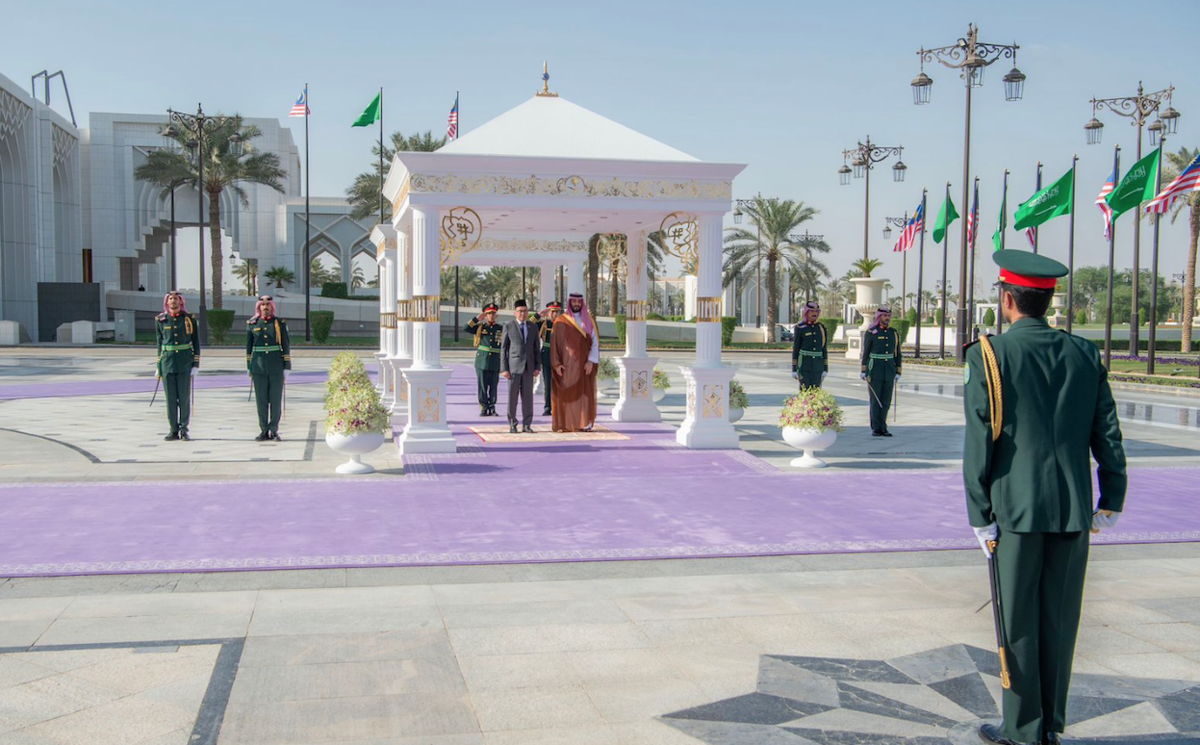
Saudi Prime Minister and Crown Prince Mohammed bin Salman with Malaysian Prime Minister Anwar Ibrahim at the official reception on Saturday in Riyadh. (SPA)
Furthermore, it urged the immediate and unconditional release of hostages and civilian detainees, especially women, children, the sick and the elderly.
Addressing the summit in his role as its country coordinator, Anwar reiterated the Saudi crown prince’s desire to see a two-state solution based on historic borders within the 1967 boundaries.
He called on all nations to come together to find a long-lasting and just solution to prevent the situation from becoming “an unprecedented humanitarian crisis” that could widen into a regional and even into a global conflict.
“The Palestinians must be returned their land, homes and properties,” Anwar said. “They must be allowed to live in peace and dignity in their own sovereign state in internationally recognized borders, based on the pre-1967 borders, with East Jerusalem as its capital.”
While the Israel-Hamas conflict overshadowed the summit, the leaders of the two blocs also adopted a roadmap, the Framework of Cooperation 2024-2028, covering agriculture and food security, banking and financial services, connectivity, counterterrorism, energy, tourism, trade and investment, as well as culture, education, and information. They also agreed to explore joint strategies on micro, small and medium enterprise development policies.
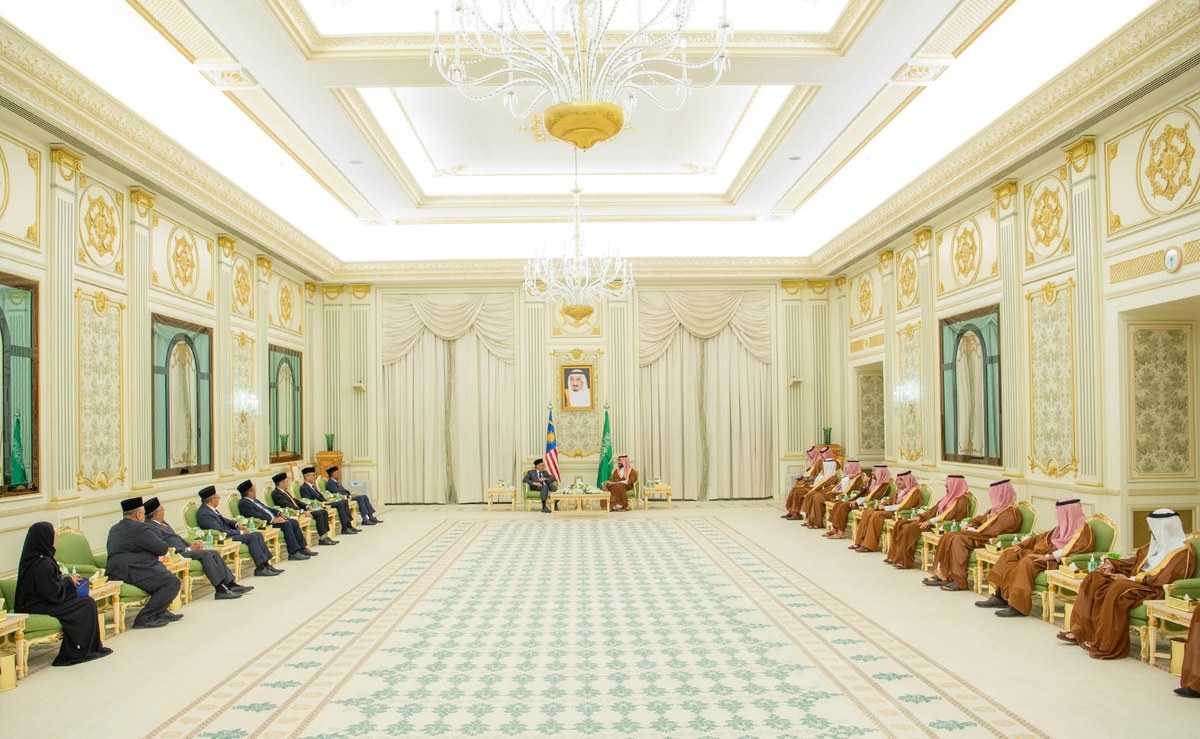
Saudi Prime Minister and Crown Prince Mohammed bin Salman with Malaysian Prime Minister Anwar Ibrahim at the official reception on Saturday in Riyadh. (SPA)
“This is historic in a sense that the GCC and ASEAN are two small regional groups that are economically very vibrant, and we are entering to this collaboration without the influence of the big powers, and to essentially benefit from the strength in the GCC, with the phenomenal growth, and the sustainability in ASEAN,” Anwar said.
“We had been discussing this for years, and then the crown prince said, ‘OK, let me host it.’ So, we were all quite excited and because of the crown prince’s support and the presence of all leaders of GCC and ASEAN, we settled on the few parameters on how to further enhance the issue of trade and mechanisms to foster investment.”
Underpinning the Malaysian leader’s confidence in this formal tie-up between the Gulf and ASEAN blocs is the “phenomenal change” he has witnessed in the former, not least in Saudi Arabia over the past decade.
Having frequently visited Riyadh as a young graduate, Anwar said he is well acquainted with the region, and has personally bore witness to the rate of change.
“The Kingdom’s focus on new technology, new energy, artificial intelligence, this is reflected across the Muslim world,” he said. “People, of course, have issues or arguments or differences, but Saudi Arabia is known for its religious role, and even here it is shifting toward a modern state with its technology, its vibrant economy, and its renewable energy.
“This is something which is so particularly attractive for our countries to see and to, for example, seize that opportunity and secure whatever it is that we have. We in Asia have a long tradition of industrial investment. Malaysia, for example, has gone from being the warehouse of industry to the front end of microchips and is leading in that area.”
Further to his personal experiences in the Kingdom, as Malaysia’s PM, Anwar is governing a country that has “huge” numbers of Saudis visiting as tourists on an annual basis. Data from Tourism Malaysia put the Kingdom as the highest per capita spender to Malaysia in terms of tourism spending, with about 121,000 visiting annually, and that number continuing to climb. The attraction seems to be equally shared, with Malaysians also looking to visit Saudi Arabia.
ALSO READ:
• Tourism Malaysia concludes Saudi Arabia promotional tour
• Thrilled to host over 31k Malaysian Hajj pilgrims this year, Saudi minister says
“There is a lot of reference to the fact that there is a sort of special relationship between Saudi Arabia and Malaysia, one that has existed for centuries,” Anwar said. “You study any historical account, be it Islamic or Islamization or Hajj and anti-colonial activities, all have the links between the traditional scholars and Saudi Arabia, particularly those around Makkah, a center for learning.
“And then, of course, Hajj is a major factor. I am fortunate because I was a young graduate. I used to engage with universities here in Jeddah, where they had the Hajj center. And you can see the preparedness to learn and make the necessary changes.”
Despite the history of synergistic interaction between the two countries, Anwar is not content to let it rest.
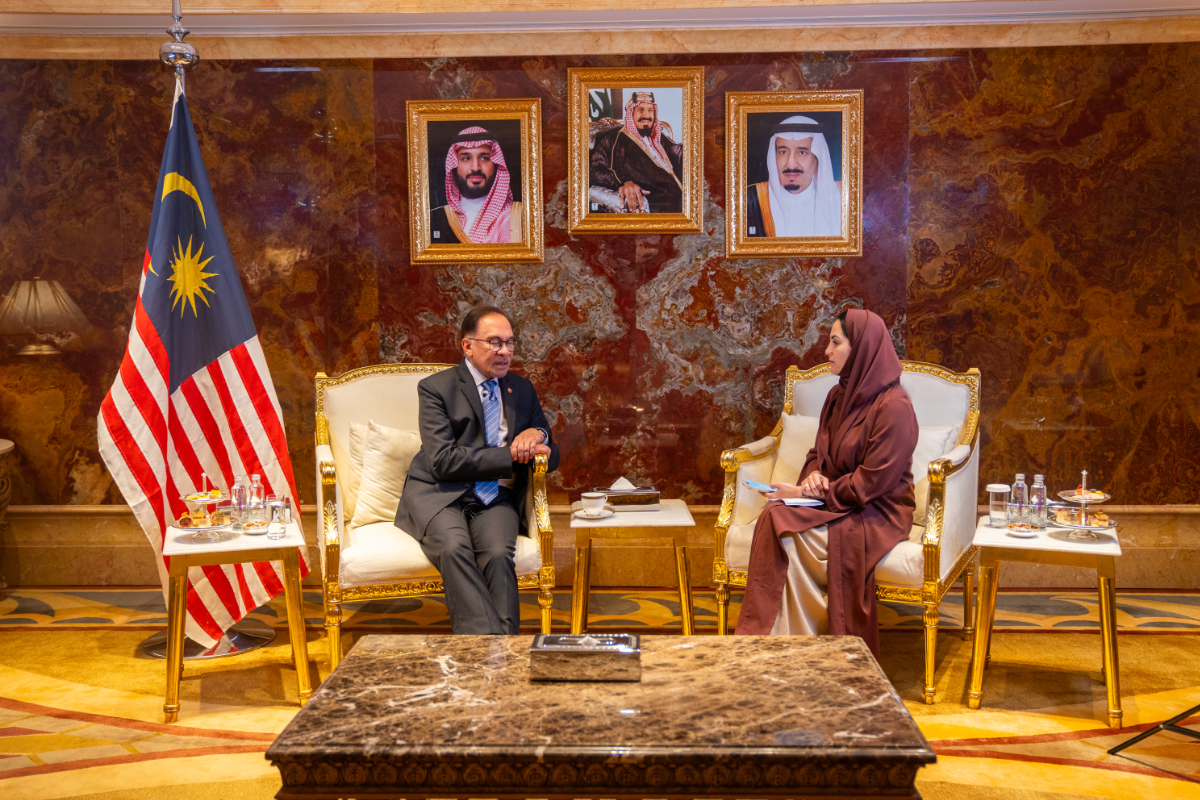
Anwar Ibrahim, prime minister of Malaysia, speaks to Noor Nugali, assistant editor in chief of Arab News. (AN photo by Abdulrahman bin Shulhub)e
“Ask me, is it enough? I would say no, which means we should try to work out some mechanisms where we can not only facilitate but accelerate the process. I think that’s generally why meetings such as (the GCC-ASEAN Riyadh Summit) are important. That’s why it’s not just the foreign minister but also the international trade minister was here.
“Because they will have to follow up on the specific areas that we can explore.”
Anwar said while the link and level of trust between Saudi Arabia and Malaysia “is quite unique,” in terms of collaboration there is a lot more that can be achieved.
“So, in my bilateral meeting with the crown prince I hope to emphasize this,” he said.
“Let us, then, do more, use that historical precedent and build (ties) anew, between the new Saudi Arabia and the new Malaysia, with the changes and the new government administration.
“The collaboration should be enhanced.”
